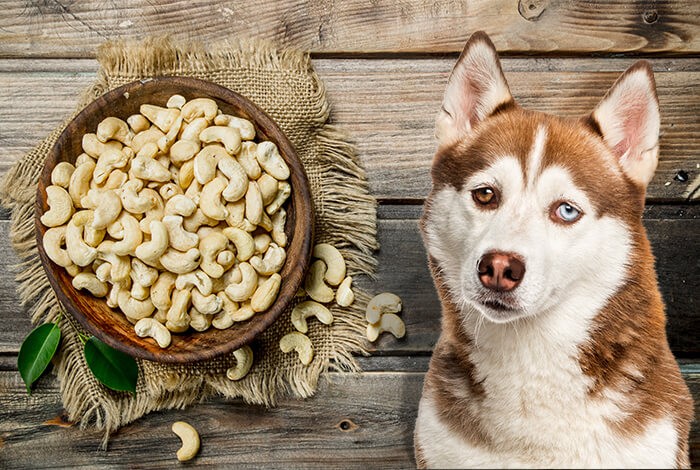
Cashew Nut – a popular and crunchy treat loved by many people around the world! Its a perfect nut which should be add in our diets but at the same time is it also perfect for our dogs too! “Can Dogs Eat Cashews?” Cashew nut are not toxic like macadamia nuts but still this nut also have some risk for dogs. Just like humans, dogs can enjoy a variety of snacks, but certain foods, cashews included, might cause unexpected harm. So every pet owner should be concerned while feeding this nuts to their dogs.
In this article, we are going to explore five shocking reasons why they should be avoided in your dog’s diet. Before tossing your dog a cashew as a treat, it’s important to understand the hidden dangers and health concerns. So, let’s dive into the truth about cashews and how to keep your dog safe and healthy!
Can Dogs Eat Cashews?
While cashews aren’t toxic to dogs like some other nuts, they should be avoided. These creamy, delicious nuts might seem harmless, but they pack too much fat and pose several health risks that make them unsuitable for your furry friend.
Why Cashews Are Problematic for Dogs:
- High fat content – Can trigger pancreatitis, a serious and painful condition
- Digestive upset – May cause vomiting, diarrhea, and stomach discomfort
- Choking hazard – Their size and texture can obstruct airways
- Calorie overload – Can contribute to unhealthy weight gain
- Salt concerns – Salted varieties add unnecessary sodium to their diet
Even though cashews won’t poison your dog like macadamia nuts or chocolate, the potential health complications simply aren’t worth the risk. Your pup’s digestive system isn’t designed to handle these rich, fatty treats. Instead, stick to dog-safe alternatives like small pieces of apple, carrots, or specially formulated dog treats that provide nutrition without the worry.
When in doubt, always consult your veterinarian about safe snack options for your four-legged family member.
Reason #1: High Fat Content Can Cause Pancreatitis
When it comes to cashews and your furry friend, the biggest concern isn’t whether they’re toxic—it’s their high fat content. Cashews contain about 44% fat, which might not sound alarming to us humans, but for dogs, this can spell serious trouble.
Understanding Pancreatitis in Dogs
Pancreatitis occurs when your dog’s pancreas becomes inflamed, often triggered by consuming high-fat foods like cashews. Think of it as your pup’s digestive system going into overdrive and then crashing. This condition can range from mild discomfort to a potentially life-threatening emergency.
Warning Signs to Watch For
If your dog has gotten into your cashew stash, keep an eye out for these symptoms:
- Vomiting (sometimes repeatedly)
- Diarrhea or loose stools
- Abdominal pain (your dog may arch their back or seem uncomfortable when touched)
- Lethargy and loss of appetite
- Difficulty lying down comfortably
While a single cashew probably won’t hurt your dog, making cashews a regular treat can cause pancreatitis in dogs. The high fat foods dogs should avoid include not just cashews, but also other nuts, fatty meats, and rich table scraps.
Remember: Prevention is always better than treatment. Keep those cashews safely stored away from curious paws, and stick to dog-approved treats that won’t put your pet’s health at risk.
Reason #2: Risk of Obesity and Weight Gain
Cashews pack a serious caloric punch—about 553 calories per 100 grams! While that handful might seem tiny to you, it’s a calorie bomb for your dog. Just a few cashews can represent a significant portion of their daily caloric needs, especially for smaller breeds.
Here’s why those calories add up fast:
- A single cashew contains roughly 8-10 calories
- Small dogs (under 20 lbs) only need 200-400 calories daily
- Medium dogs (20-50 lbs) require 400-800 calories per day
- Even 5-6 cashews could be 10% of a small dog’s daily intake
The Weight Gain Domino Effect
When dogs consume too many high-fat, calorie-dense foods like cashews regularly, weight gain becomes inevitable. This extra weight doesn’t just affect their appearance—it creates a cascade of health problems:
Serious health consequences include:
- Diabetes risk increases as excess weight affects insulin sensitivity
- Joint stress and arthritis from carrying extra pounds
- Heart strain and reduced mobility
- Shortened lifespan due to obesity-related complications
Your dog’s joints weren’t designed to carry excess weight, and those “just a few cashews” treats can contribute to painful conditions that affect their quality of life for years to come.
Reason #3: Salt Toxicity from Salted Cashews
Here’s something that might surprise you: those delicious salted cashews sitting in your kitchen cabinet could be dangerous for your furry friend. Most commercial cashews come heavily salted, and while that extra flavor makes them irresistible to us humans, it creates a serious health risk for dogs.
Why Salted Cashews Are Toxic to Dogs
The salt content in commercial cashews is simply too high for dogs to handle safely. Unlike humans, dogs have a much lower tolerance for sodium. What seems like a harmless snack to us can quickly become toxic to them.
When dogs consume too much salt, they can develop sodium ion poisoning, a serious condition that requires immediate veterinary attention.
Warning Signs of Salt Toxicity
If your dog has gotten into salted cashews, watch for these symptoms:
- Vomiting – Often the first sign you’ll notice
- Diarrhea – May be severe and persistent
- Excessive thirst – Your dog may seem constantly thirsty
- Weakness – They may seem lethargic or wobbly
- Muscle tremors – Shaking or trembling
- Seizures – In severe cases, this can be life-threatening
Even if plain cashews might be okay in tiny amounts, salted cashews should always be off-limits for dogs. The risk of sodium poisoning simply isn’t worth it. Keep those salty snacks safely stored away from curious paws and noses.
Reason #4: Choking Hazard and Digestive Blockage
Cashews might seem harmless, but their size and hardness can create serious problems for our furry friends. These curved nuts are particularly tricky because they can easily get lodged in your dog’s throat, especially if your pup tends to gulp down food without chewing properly.
Small dogs face the biggest risk:
- Toy breeds and puppies have narrower airways
- A whole cashew can completely block their windpipe
- Even medium-sized dogs can struggle with larger cashew pieces
The Digestive Danger Zone
Beyond choking, cashews can cause digestive blockages that require emergency surgery. When dogs swallow cashews without proper chewing, these hard nuts can:
- Get stuck in the esophagus on their way down
- Create blockages in the stomach or intestines
- Cause severe pain and vomiting
- Lead to life-threatening complications
Watch for these warning signs:
- Excessive drooling or pawing at the mouth
- Difficulty swallowing or breathing
- Vomiting or retching
- Loss of appetite or lethargy
If you notice any of these symptoms after your dog has eaten cashews, contact your veterinarian immediately. When it comes to nuts and dogs, it’s always better to be safe than sorry.
Reason #5: Raw Cashew Shell Toxicity
When it comes to cashews and your furry friend, there’s one critical danger that many pet owners don’t know about: raw cashew shells contain a toxic substance called urushiol.
What Makes Raw Cashews Dangerous?
- Same toxin as poison ivy: Urushiol is the exact same compound that makes poison ivy so irritating to humans
- Hidden in the shell: While the cashew nut itself might seem harmless, the shell packs a serious toxic punch
- Severe health risks: Even small amounts can cause serious illness in dogs
Why This Matters for Your Dog
Raw cashews with shells still attached pose a life-threatening risk to your pet. The urushiol can cause:
- Severe digestive upset
- Skin irritation and burns
- Difficulty breathing
- In extreme cases, death
The Good News
Store-bought cashews are typically processed and roasted, which removes most of the shell and reduces toxin levels. However, it’s always safer to stick with dog-approved treats instead of taking any chances with your beloved companion.
Bottom line: Never give your dog raw cashews, especially those that haven’t been properly processed. When in doubt, choose pet-safe alternatives that won’t put your furry family member at risk.
What If My Dog Ate Cashews?
Don’t panic if you caught your furry friend sneaking cashews from your snack bowl! While cashews aren’t toxic to dogs like some other nuts, there are still important steps you should take to keep your pup safe and comfortable.
Immediate Steps to Take
First, stay calm and assess the situation:
- Check the quantity – A few cashews won’t hurt, but a whole handful could cause problems
- Identify the type – Were they plain, salted, or flavored? Salted cashews are more concerning due to high sodium content
- Note the time – This helps you monitor symptoms and provides useful information for your vet
Watch for These Symptoms
Keep a close eye on your dog for the next 24-48 hours:
- Vomiting or diarrhea
- Excessive thirst or urination (from salt)
- Lethargy or unusual behavior
- Loss of appetite
- Difficulty walking or weakness
When to Contact Your Veterinarian
Call immediately if your dog:
- Ate a large quantity of cashews
- Consumed heavily salted or flavored varieties
- Shows any concerning symptoms
- Is a small breed (they’re more sensitive to dietary changes)
For peace of mind, it’s always okay to call your vet’s office even if symptoms seem mild. They know your dog’s health history and can provide personalized advice.
Remember, prevention is key! Keep all nuts stored safely away from curious paws to avoid future snack-stealing adventures.
Safe Alternatives to Cashews
While cashews aren’t toxic to dogs, there are much better alternatives that will keep your furry friend happy and healthy. Let’s explore some safe and nutritious options that your dog will love just as much!
Dog-Safe Nuts in Moderation
Unsalted peanuts are your best bet when it comes to nuts for dogs. Here’s what you need to know:
- Plain, unsalted peanuts only – Skip the salted, flavored, or chocolate-covered varieties
- Remove shells completely – They’re a choking hazard and hard to digest
- Stick to small amounts – A few peanuts as an occasional treat, not a daily snack
- Check for allergies first – Some dogs can be allergic to peanuts too
Remember, peanuts are technically legumes (like beans and peas), not true nuts. This makes them easier for most dogs to digest than tree nuts like cashews.
Healthy Alternatives
Skip the nuts altogether and try these safe, nutritious alternatives:
- Carrot sticks – Crunchy, low-calorie, and great for dental health
- Apple slices (remove seeds and core) – Sweet, refreshing, and full of fiber
- Blueberries – Antioxidant powerhouses that most dogs love
- Green beans – Plain, steamed green beans make excellent low-calorie treats
- Dog-specific treats – Always check labels for quality ingredients
Portion Guidelines
Keep treats to 10% of your dog’s daily calories. For a 25-pound dog, that’s roughly:
- 2-3 baby carrots
- 3-4 apple slices
- 1 tablespoon of blueberries
- 2-3 plain peanuts
When in doubt, ask your vet about the best treats for your specific dog’s size, age, and health needs.
Signs of Cashew-Related Health Issues
While cashews aren’t toxic to dogs, they can still cause problems for some pups. Keep an eye out for these warning signs after your dog has eaten cashews.
Pancreatitis Symptoms
Watch for these serious signs:
- Vomiting or dry heaving
- Loss of appetite
- Lethargy or weakness
- Abdominal pain (your dog may arch their back or seem uncomfortable)
- Diarrhea
- Fever
Pancreatitis can be life-threatening, so contact your vet immediately if you notice these symptoms.
Allergic Reactions (Rare but Possible)
Look out for:
- Excessive scratching or licking
- Red, irritated skin
- Swelling around the face or mouth
- Difficulty breathing
- Hives or rash
Food allergies in dogs are uncommon, but they do happen. If you suspect an allergic reaction, seek veterinary care right away.
Digestive Upset Indicators
Common mild symptoms include:
- Loose stools or diarrhea
- Stomach gurgling sounds
- Gas or bloating
- Temporary loss of appetite
- Restlessness or discomfort
These symptoms usually resolve within 24-48 hours. If they persist or worsen, call your vet for guidance.
Expert Veterinarian Opinions
When it comes to feeding cashews to your furry friend, veterinary professionals have some important insights to share. Dr. Sarah J. Wooten, a well-known veterinary expert, warns pet owners about the potential risks of high-fat foods like cashews. “While cashews aren’t toxic to dogs, their high fat content can trigger pancreatitis in sensitive pets,” she explains. This serious condition causes painful inflammation of the pancreas and can be life-threatening.
Key Veterinary Recommendations:
- Moderation is crucial – Most vets agree that if you choose to share cashews, limit it to 1-2 nuts occasionally
- Watch for warning signs – Veterinary nutritionists emphasize monitoring your dog for vomiting, diarrhea, or lethargy after eating any new food
- Consider safer alternatives – Many animal nutrition experts recommend dog-specific treats instead of human snacks
The consensus among veterinary professionals is clear: while cashews won’t poison your dog, they’re simply not the best choice for canine health. Your vet knows your pet’s individual needs best, so always consult them before introducing new foods to your dog’s diet.
Conclusion
While cashews aren’t toxic to dogs and won’t cause immediate harm if your furry friend sneaks a few, they’re simply not worth the risk. Think of cashews as that friend who seems nice but brings unnecessary drama – technically harmless, but why invite the complications?
Your dog’s health is precious, and can dogs eat cashews safely? The answer is: why take the chance when better options exist? When in doubt about any human food, consult your veterinarian – they’re your best partner in keeping your beloved companion happy, healthy, and tail-wagging for years to come.
FAQ
Can dogs eat cashews safely?
Dogs can eat plain cashews in small amounts, but they are not the best snack. Cashews are high in fat, which can upset your dog’s stomach or cause weight gain. Too many can even lead to pancreatitis.
Why are cashews bad for dogs?
Cashews are bad for dogs because they are rich in fat and salt. Eating too many can cause stomach problems, obesity, and even long-term health issues. Some dogs may also have allergies, making cashews unsafe for them.
Can dogs eat salted or flavored cashews?
No, dogs should not eat salted or flavored cashews. Added salt, seasonings, or spices like garlic and onion are toxic for dogs. Always avoid giving your dog any type of flavored nuts.
What happens if a dog eats too many cashews?
If a dog eats too many cashews, they may vomit, have diarrhea, or develop stomach pain. In severe cases, high fat can trigger pancreatitis. Contact your vet if your dog shows signs of illness after eating cashews.
What are safe alternatives to cashews for dogs?
Safe alternatives include plain carrots, apples (without seeds), blueberries, or dog treats made for pets. These snacks are healthier and easier for dogs to digest. Always introduce new foods slowly and in small amounts.



